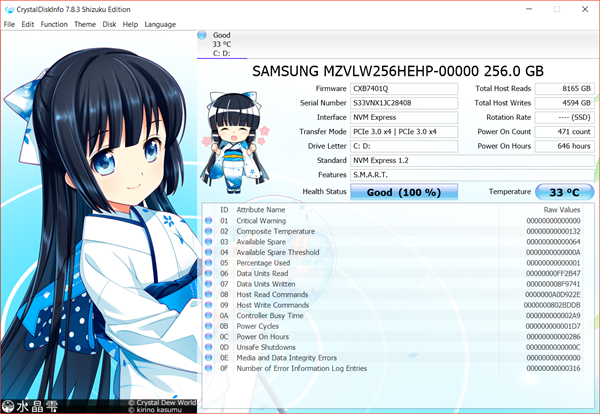

This is probably all you really need to concern yourself with: = START OF READ SMART DATA SECTION = Now, when you execute smartctl -a /dev/sda you should then see a self-assessment test result. Note, in most circumstances you do not need to unmount the drive to execute these tests.

Or a more thorough test (which took me about 1.5 hours): # smartctl -t long -a /dev/sda You can then execute a self-test by doing either a short test (which took me about 1 minute): # smartctl -t short -a /dev/sda You need to enable that by executing the following as root: # smartctl -s on -a /dev/sda SMART support is: Available - device has SMART capability. However when I execute the command to show the drive info, it looks like SMART was disabled: # smartctl -a /dev/sda
SAMSUNG SSD HEALTH CHECK TOOL INSTALL
Similar to this answer execute # apt-get install smartmontools I did not find another tool for linux that made the 'correct' information transparent or clear.įor Kingston drives on Debian-based computers Instead of telling you it 'doesn't know' - smartctl just mislabeled the attribute.

Perhaps it will improve in the future, but the version installed by default for Ubuntu 12.04 LTS (April, 2014) was total fail. The so-what: If you don't have an Intel SSD- do not be mislead by the false attribute name labels provided by smartmonitor. see the attribute label chart on for the only useful indication of the degree of variability that I found. ( Samsung: I'm very disappointed, please either fix your official software-tool, or at least make it clear that you do not provide wear out indication information!)įurther - if you have neither an Intel SSD nor Samsung SSD - be warned, this info does seem to vary across manufacturers. The document indeed implies that the attribute 'hex E9' /'decimal '233' is not used by Samsung the same way. To be as sure as I can, I dug and dug and was finally able to locate at least something from Samsung official: Samsung White Paper 07: Communicating With Your SSD By contrast the smartctl tool explicitly labeled the attribute with 'decimal- 233 / 'hex- E9' as "Media Wearout Indicator" - and told me its value was "1" or 1% - an indicator of (the risk of) pending failure.
SAMSUNG SSD HEALTH CHECK TOOL WINDOWS
This and other forum postings, stack-exchange question/answers, and power-user blogs I found seem to be 'Intel focused,' with only vague hints that 'it may vary.' (Versus any suggestion that you need to watch out for wrong and erroneous labeling of the attribute by smartmontools).Īs I was preparing to copy my SSD to a new harddrive I'd bought (because of what smartmontools had told me), I booted to windows (I have a dual boot system), to learn something about SSD's from what the windows-only Samsung tool 'Samsung_Magician_v43.exe' had to tell me about my drive - it was shockingly uninformative.Īfter what's been hours of digging - I've finally been able to run the windows only tools: hddgaurdian, and then also CrystalDiskInfo: Surprise! both tools independently tell me my Samsung SSD is 'just fine' (hdd guardian says '5 stars' and Crystal Disk "98% OK"). Watch out !! - I was blithely mislead by 'smartmontools.' I have a Samsung SSD, and the smartmonitor/'smartctl' tool happily misreported that '233' (hex 'E9') attribute was 'Media_Wearout_Indicator' in fact - no, for Samsung (and other manufacturers) it is up to entirely different. If you don't have an Intel-brand SSD: READ THIS.


 0 kommentar(er)
0 kommentar(er)
